"Heart of Oak" is the official march of the Royal Navy of the United Kingdom. It is also the official march of several Commonwealth navies, including the Royal Canadian Navy and the Royal New Zealand Navy. It was also the official march of the Royal Australian Navy, but has now been replaced by the new march, "Royal Australian Navy".

"Marching Through Georgia" is a marching song written by Henry Clay Work at the end of the American Civil War in 1865. The title and lyrics of the song refer to U.S. Army major general William T. Sherman's "March to the Sea" to capture the Confederate city of Savannah, Georgia in late 1864.
"Sussex by the Sea" is a patriotic song written in 1907 by William Ward-Higgs, often considered to be the unofficial county anthem of Sussex. It became well known throughout Sussex and is regularly sung at celebrations throughout the county. It can be heard during many sporting events in the county, during the Sussex bonfire celebrations and it is played by marching bands and Morris dancers across Sussex. It is the adopted song of Brighton & Hove Albion Football Club, Sussex Division Royal Naval Reserve, Sussex Association of Naval Officers and Sussex County Cricket Club.
John Walter Bratton was an American Tin Pan Alley composer and theatrical producer who became popular during the era known as the Gay Nineties.
"Deck the Halls" is a traditional Christmas carol. The melody is Welsh, dating back to the sixteenth century, and belongs to a winter carol, "Nos Galan", while the English lyrics, written by the Scottish musician Thomas Oliphant, date to 1862.
"Over the Hills and Far Away" is a traditional British song, dating back to at least the late 17th century. One version was published in Thomas D'Urfey's Wit and Mirth, or Pills to Purge Melancholy; a very different one appeared in George Farquhar's 1706 play The Recruiting Officer. A version also appears in John Gay's The Beggar's Opera of 1728.
Old Polina is a traditional Newfoundland folk song. It is most likely based on the ship Polynia, built in 1861, of the Dundee Seal and Whale Fishing Company fleet. Polynia was commanded by Captain William Guy from 1883 to 1891, when she was sunk by ice in Davis Strait. This song is similar to another song called The Balaena, about another whaler.
Blow the Man Down is an English sea shanty. The lyric "Blow the man down" most likely refers to a common mishap at sea during the age of sail wherein a strong, sudden gale catches a ship with its topsails fully set – the force of the wind, depending upon the load and balance of the ship's cargo, can actually "blow the man down", or blow the man-o'-war down into the water, partially capsizing it. When this occurs during a violent storm, the result is almost always a loss of the ship, however there are techniques for righting the vessel in relatively calm positions.

"Semper Paratus" is a 1928 song and the official march of the United States Coast Guard, having been composed in 1927 by U.S. Coast Guard Captain Francis Saltus Van Boskerck.
Captain Ward and the Rainbow, or Ward the Pirate, is Child ballad 287. It recounts a tale of the pirate Captain Ward, likely Jack Ward.
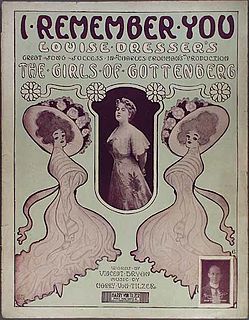
The Girls of Gottenberg is an Edwardian musical comedy in two acts by George Grossmith, Jr. and L. E. Berman, with lyrics by Adrian Ross and Basil Hood, and music by Ivan Caryll and Lionel Monckton. P. G. Wodehouse's personal papers indicate that he wrote the lyrics for one song, "Our Little Way", but this was not included in the libretto of show, and he was not credited as a lyricist.

Rip Van Winkle is an operetta in three acts by Robert Planquette. The English language libretto by Henry Brougham Farnie was based on the short stories "The Legend of Sleepy Hollow" (1820) and "Rip Van Winkle" (1819) by Washington Irving after the play by Dion Boucicault and Joseph Jefferson.

"Asleep in the Deep" is a song written by Arthur J. Lamb and composed by Henry W. Petrie in 1897. It is titled after a refrain at the end of the song. The phrase "asleep in the deep" refers to those who have drowned. The lyrics alludes to those who have met such a fate, while at sea.
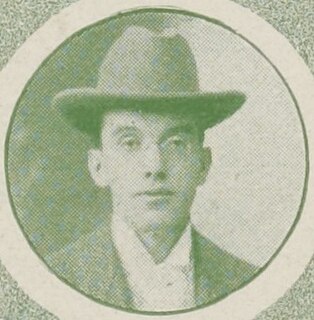
Arthur J. Lamb was a British lyricist best known for the 1897 song "Asleep in the Deep" and the 1900 song "A Bird in a Gilded Cage". He collaborated with many song-writers, including siblings Albert Von Tilzer and Harry Von Tilzer, Henry W. Petrie and Kerry Mills.

Killaloe is the Regimental Quick March of the British Army regiment, The Royal Irish Regiment. It has informal, historical associations with other Irish Regiments and Brigades: as an unofficial march by the Connaught Rangers and Royal Inniskilling Fusiliers and at brigade level in World War II by the 38th (Irish) Infantry Brigade. It is also the regimental march of the South African Irish Regiment.
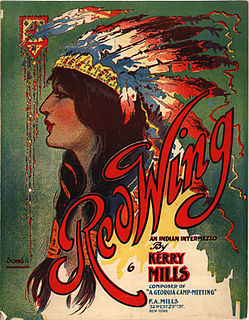
"Red Wing" is a popular song written in 1907 with music by F.A Mills and lyrics by Thurland Chattaway. Mills adapted the music of the verse from Robert Schumann's piano composition "The Happy Farmer, Returning From Work" from his 1848 Album for the Young, Opus 68. The song tells of a young Indian girl's loss of her sweetheart who has died in battle.
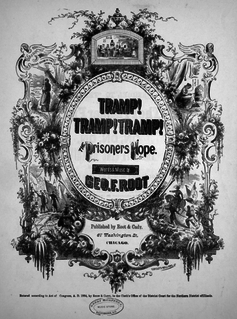
"Tramp! Tramp! Tramp! " was one of the most popular songs of the American Civil War. George F. Root wrote both the words and music and published it in 1864 to give hope to the Union prisoners of war. The song is written from the prisoner's point of view. The chorus tells his fellow prisoners that hope is coming.
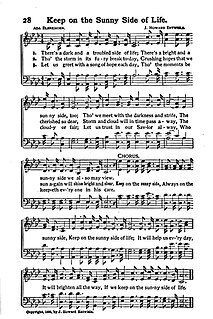
Keep on the Sunny Side is a popular American song originally written in 1899 by Ada Blenkhorn (1858–1927) with music by J. Howard Entwisle (1866–1903). The song was popularized in a 1928 recording by the Carter Family. A recording of the song with The Whites was featured in the 2000 movie O Brother, Where Art Thou?.
"The Kerry Recruit" is an Irish song referring to the Crimean War. The song's lyrics are from the point of view of an Irish soldier.

"Il était un petit navire" is a traditional French song that is now considered a children's song, despite its macabre tone.











